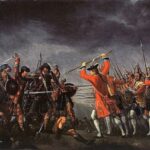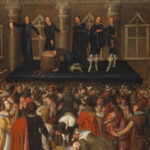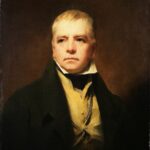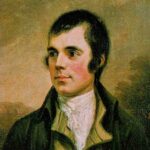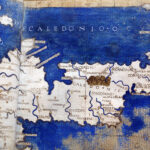Thomas Carlyle (1795–1881): Scotland’s Prophet of Power and the Pen
He never commanded a regiment, never laid siege to a city, and never once stood on a battlefield—but in the fierce wars of the 19th-century mind, Thomas Carlyle was a general in full. Armed with prose as jagged and thunderous as musket fire, Carlyle marched against what he saw as the twin plagues of his age: moral decay and soulless materialism. A philosopher by training, a historian by calling, and a prophet by temperament, Carlyle reshaped Victorian Britain’s moral vocabulary, launching assaults from his writing desk with a ferocity that left friends, enemies, and readers alike shaken. As historian A.L. Rowse wrote, “Carlyle was not just a thinker—he was a force of nature who made thought militant” (Rowse, The Victorian Encounter, 1971).
Born in Ecclefechan, Dumfriesshire, in 1795, Carlyle grew up in the stern Presbyterian soil of the Scottish Lowlands. It was a world of Bible and thunder, of cold discipline and high moral seriousness—exactly the kind of world he would later simultaneously revere and rebel against. He studied mathematics at the University of Edinburgh, but it was language, not numbers, that ignited his inner fire. His early forays into literature included translations of Goethe and essays on German Romanticism—acts of intellectual insurrection in a country still suspicious of continental ideas. But even then, Carlyle’s real target was not metaphysics. It was the soul of the nation.
His rise to prominence came with Sartor Resartus (1836), a bizarre, genre-defying book that mixed fiction, philosophy, and satire to ask what remained after traditional religion had collapsed. The book was a critical failure—but a cult success, drawing the attention of Ralph Waldo Emerson and launching Carlyle’s influence in both Britain and America. Yet his true battlefield debut came in 1837, with the publication of The French Revolution: A History. Here, Carlyle unleashed a new kind of historical writing: raw, immediate, and psychological. He portrayed events not as dry chronology but as moral drama, with revolutionaries and monarchs alike staggering under the weight of history. “The Bastille falls,” he wrote, “and what shall follow it?” It was a question that haunted every age—and defined his own.
Carlyle’s greatest contribution was not to political theory or philosophical systems, but to moral awakening. In a Victorian world mesmerized by commerce and parliamentary politics, he thundered for character, heroism, and leadership. His On Heroes and Hero-Worship (1841) remains one of the most potent calls for moral greatness ever penned, declaring that “history is the biography of great men.” Whether prophet, poet, or king, Carlyle believed that civilization depended not on systems but on visionary individuals who could shape destiny. It was a doctrine that inspired readers from Lincoln to Lenin, from Dickens to Hitler—though not always in ways Carlyle might have endorsed.
But like any general, Carlyle suffered setbacks. As he aged, he grew increasingly pessimistic and authoritarian, railing against democracy, capitalism, and modernity with equal venom. His infamous Occasional Discourse on the Negro Question (1849)—in which he appeared to justify slavery under the guise of “order and labor”—permanently damaged his reputation. Even his admirers were stunned. John Stuart Mill, once his confidant, broke with him over it. As biographer Fred Kaplan noted, “Carlyle’s fierce moral clarity sometimes darkened into contempt for those he deemed weak or unworthy” (Kaplan, Thomas Carlyle: A Biography, 1983). He was a man of contradictions: champion of the working class who despised mass democracy; prophet of order who feared institutions; a Scottish moralist who, in many ways, had outgrown his country’s intellectual borders.
Yet Scotland remained at Carlyle’s core. He never ceased to view the world through the prism of a Kirk-imbued conscience and a Highlander’s suspicion of soft speech. Even in London, where he lived most of his adult life, Carlyle spoke with the bluntness of the Borders and kept the granite of Ecclefechan in his heart. He revered Scottish Enlightenment thinkers—Burns, Knox, and the ghost of Samuel Johnson—but saw himself as their scalding heir, warning a complacent Britain of spiritual collapse beneath the weight of its own machinery.
He died in 1881, alone, revered, and exhausted. A crowd of thousands followed his coffin through the rain-soaked streets of Edinburgh, yet Carlyle had declined burial in Westminster Abbey, insisting on resting in the quiet soil of Ecclefechan. His was not a life of serenity but of struggle. He did not offer systems—he offered storms. “Carlyle hurled the lightning,” wrote G.K. Chesterton, “but he was too proud to claim the sunshine.”
Scotland, in the years following his death, grappled with his legacy. To some, he was the last great Scottish moralist, the final thunderclap of a religious-intellectual tradition that stretched from Knox to Hume. To others, he was a reactionary voice, railing against a world that had passed him by. But none denied his power. For a century, Carlyle’s shadow loomed over every Scottish thinker, every British moralist, every soul who feared that greatness was slipping away.
References
- Carlyle, Thomas. On Heroes, Hero-Worship, and the Heroic in History. London: Chapman and Hall, 1841.
- Carlyle, Thomas. The French Revolution: A History. 1837.
- Kaplan, Fred. Thomas Carlyle: A Biography. University of California Press, 1983.
- McGowan, John. The Visionary Enlightenment: Carlyle, Ruskin and the Romantic Tradition. Cornell University Press, 1996.
- Rowse, A.L. The Victorian Encounter. Macmillan, 1971.
- Chesterton, G.K. Heretics. London: John Lane, 1905.

